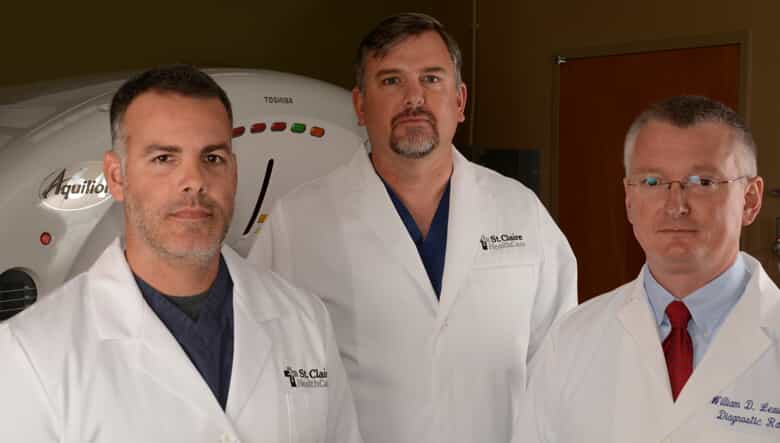Kentucky Health Collaborative Hospitals Join Forces to Decrease Lung Cancer Mortality Rates in Kentucky
- Category: General News
- Posted On:
- Written By: Andrea R. Slone, Manager, Clinical & Advocacy Programs, Kentucky Health Collaborative

Kentucky Health Collaborative (KHC) Members are joining forces to bridge the gap between high-quality health care providers and services and the poor health outcomes of Kentuckians. As a part of KHC’s mission to improve the quality of health in Kentucky, the KHC Executive Committee has prioritized the need to reduce lung cancer mortality as the KHC’s first collaborative effort to improving health outcomes in the Commonwealth.
The KHC has launched a Lung Cancer Screening, Detection and Treatment Initiative with objectives to diagnose more lung cancer cases in earlier stages of disease, improve access and coordination of treatment and decrease Kentucky’s lung cancer mortality rates. Key components of this initiative consist of screening and early detection, treatment and retention, improving areas of health care policy, data gathering and prevention and awareness. “KHC Members are dedicated to saving, extending and improving the lives of patients in the Commonwealth. Through the KHC Lung Cancer Screening, Detection and Treatment Initiative our members are joining together to care for those who are at risk and those diagnosed with lung cancer, said KHC Managing Director David Zimba.
Listed below are a few crucial facts that you should know about lung cancer:
- Lung cancer is the most common cancer worldwide and kills more Americans than breast, prostate and colon cancer combined. The rate of new lung cancer cases in Kentucky is significantly higher than the national average; ranking Kentucky 51st among all states, including the District of Columbia.
- The use of combustible cigarettes (traditional cigarettes) is the leading cause of lung cancer. In Kentucky, approximately 809,500 adults use combustible cigarettes (approximately 23.4% of the adult population).
- Nonsmokers who are exposed to secondhand smoke at home or at work increase their risk of being diagnosed with lung cancer by 20% to 30%.
- The CDC reported that in 2016 there were 4,761 cases and 3,328 deaths resulting from Lung and Bronchus Cancers in Kentucky. In 2019, an estimated 3,290 Kentuckians lost their lives to lung cancer.
- A Patient’s timing of lung cancer diagnosis and prompt treatment of the disease are critical to their survival. Patients diagnosed at early stages of lung cancer are five times more likely to survive; unfortunately, only 16% of lung cancer cases nationally are diagnosed at an early stage. In Kentucky, 18.1% of lung cancer cases receive an early diagnosis; 52.5% of lung cancer cases are not caught until a late stage; at which time, the 5-year survival rate is only 3.2%.
These facts serve as a strong reminder that lung cancer awareness and taking preventive measures, such as annual health and cancer screenings, to lower your risk of developing lung cancer are critical to help change the overall course of lung cancer in our communities.
“We believe in the power of early detection through lung cancer screening," said Dr. Mark Newman, University of Kentucky executive vice president for health affairs and CEO Sponsor of the KHC Lung Cancer Screening, Detection and Treatment Initiative. "By working together, we are determined to reduce lung cancer mortality in the Commonwealth.”
During the month of January, many people set New Year Resolutions to become more physically fit and active. However, while these are impressive goals, members of KHC also suggest making continuous efforts to prevent diseases. This entails completing all preventive exams and screenings, including an annual lung cancer screening, if you meet the screening criteria.
The United States Preventative Services Task Force (USPSTF) recommends an annual screening for lung cancer with low-dose computed tomography (LDCT) for adults aged 55 to 80 years who have a 30 pack-year smoking history or who are currently smoking or have quit within the past 15 years.
It is estimated more than 170,000 Kentuckians may be eligible for a lung cancer screening today. KHC Members encourage at-risks persons to reach out to their health care providers to learn if they are eligible for and in need of a lung cancer screening. Low-dose CT Lung Cancer Screenings are available in Morehead at St. Claire Regional Medical Center. For more information or to schedule a screening, call 606.783.6761.
About the Kentucky Health Collaborative
The Kentucky Health Collaborative (“KHC”), formed in 2016, is a health care organization comprised of 10 leading health care systems, representing 60 hospitals across Kentucky as well as locations in Indiana and West Virginia. Members include Appalachian Regional Healthcare, Baptist Health, Ephraim McDowell Health, LifePoint Health, Med Center Health, Norton Healthcare, Owensboro Health, UK St. Claire, St. Elizabeth Healthcare and UK HealthCare. Together these organizations seek to serve patients across the Commonwealth by providing a full complement of community, tertiary and quaternary health care services in ambulatory and hospital settings. Based on a triple-aim approach, the KHC Members work collaboratively together to identify cost savings opportunities, address areas of health care reform, and improve health outcomes for the citizens of the communities they serve. Approximately 55 percent of all health care services provided in the Commonwealth is done so through KHC Members. For questions about the KHC and the KHC Lung Cancer Screening, Detection and Treatment Initiative, please contact Andrea R. Slone, Manager, Clinical & Advocacy Programs at 859.286.3107.
Photo Caption: If a low-dose CT Lung Cancer Screening is right for you, ask your healthcare provider to schedule an appointment with UK St. Claire. St Claire’s team of board certified radiologists Stephen A. Williams, MD (left), Craig D. Butler, MD (center), and William D. Lewis, MD (right), remain at the forefront of advanced technology providing you with a full range of advanced diagnostic and preventative screening services close to home.
